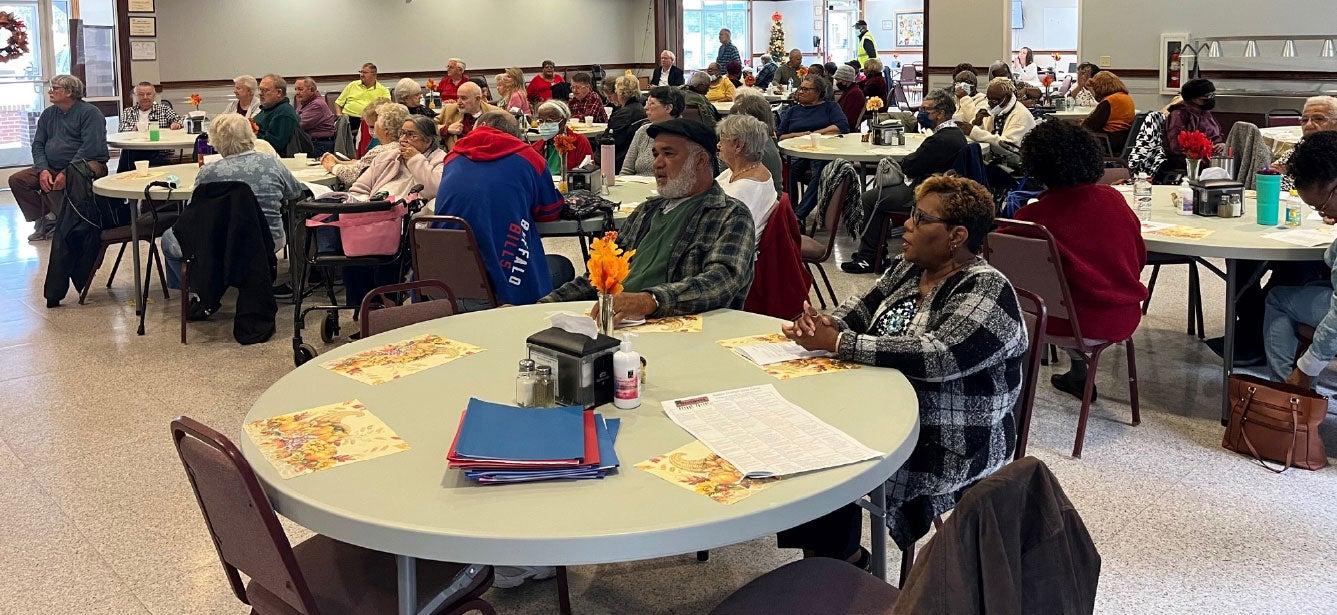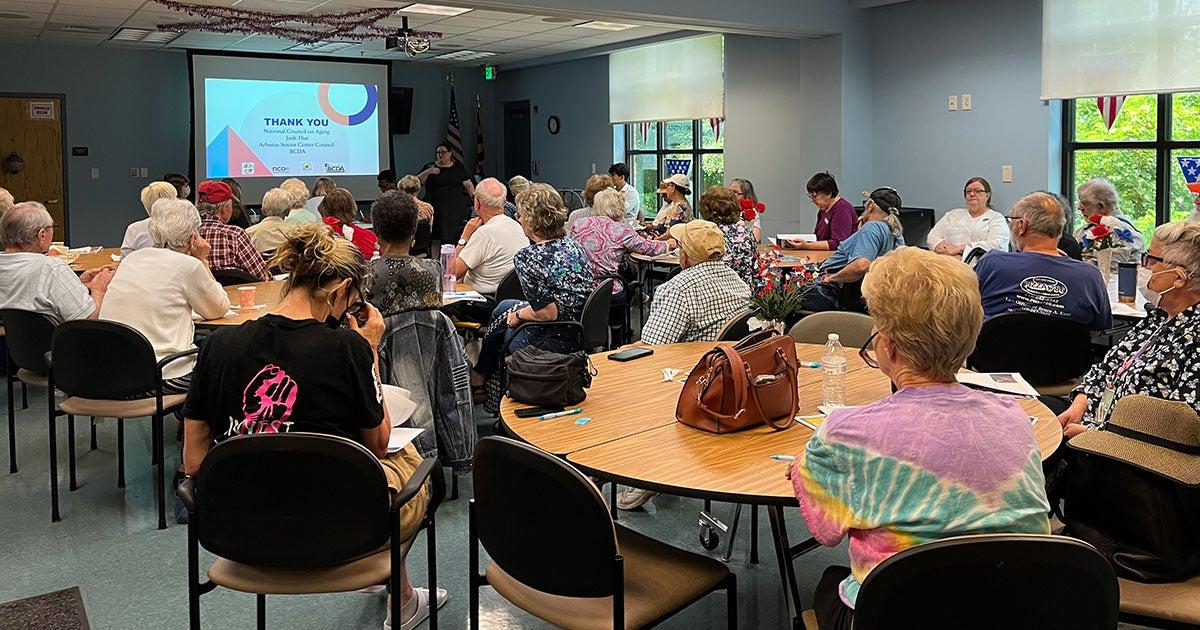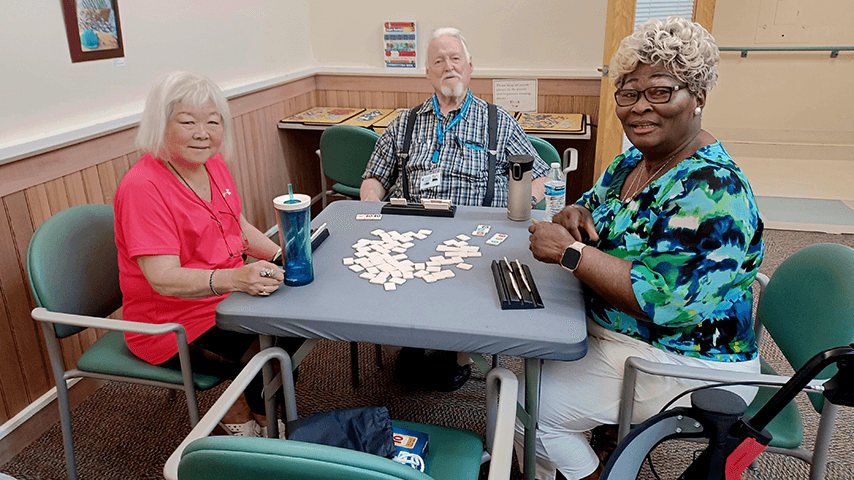Senior Center Spotlight: Chatham County Council on Aging Connects Older Adults with Benefits and Support
7 min read

The Chatham County Council on Aging and its two senior centers serve local older adults in central North Carolina all year, and April’s Boost Your Budget Week gave them another way to link people in need with benefits and support to help them age well.
Through a modest grant from NCOA, the council was able to take out half-page ads in local papers (that still have good readership), air spots on local radio stations, and post on social media platforms. Their homepage also featured the message, “It's Boost Your Budget Week! Did you know that over 15 million Americans age 65 and over struggle with rising costs on a fixed income? If you're one of them, you may be eligible for a number of programs that can help save money. Visit BenefitsCheckUp.Org today to find out more!”
Using Boost Your Budget messaging, the council is took this opportunity to connect people throughout the county to benefits and to help—with NCOA’s call center, and their two senior centers. Jimmy Lewis, Grants and Communication Manager, said that they were excited about Boost Your Budget Week.
When Lewis visited BenefitsCheckUp and entered the council’s ZIP code, he found 100 programs that would help people in Chatham County. They see this as a quick and easy way for older adults to get help with benefits that they might not know they are eligible for. And, with the increased outreach, it is a way for the council to reach a much wider audience than they normally can.
What is the history of the Chatham County Council on Aging?
The Chatham County Council on Aging was founded on July 8, 1974, by a trio of leaders in the community. The first budget was $10,000, and the offices were housed in Pittsboro in the Farm and Home Organization building. The agency hired a service coordinator and was funded by the Older Americans Act through the local area agency on aging.
In 1978, the Council on Aging moved into a new building that was renovated and used for offices through a rent-free lease. Approximately $40,000 and many hours of volunteer labor were invested in the renovation, and the new offices were occupied. Services offered included information and referral, home repair, volunteer transportation, support for senior citizen clubs, and telephone reassurance.
The original mission was “to promote the independence and dignity of our older adults and to help them remain healthy, secure and involved in their own homes and community as long as possible.”
“The agency’s mission has changed very little over the years,” according to the council’s website. “Today, the Council has a budget of $2 million, owns and operates two senior centers, both certified by the State of North Carolina as "Centers of Excellence." We annually provide more than 31,000 meals, 16,000 transportation trips, [and] 27,000 hours of in-home aide.”
What goes on at the Western Chatham and Eastern Chatham Senior Centers?
The senior centers—Western Chatham Senior Center and Eastern Chatham Senior Center—each feature:
- Fitness rooms and daily exercise programs
- Health and disease self-management sessions
- Numerous interest issues groups and caregiver support programs
- A full schedule of social and recreational opportunities, including a hiking club
The two senior centers serve as hubs for services that include weekday lunches, Meals on Wheels, Family Caregiver Support, a grandparents raising grandchildren program, aging in place services, Medicare counseling and veterans services. This includes Helping Homebound Heroes: a partnership that identifies and assesses the needs of veterans who need home repairs and then makes those repairs.
Both centers’ calendars are full of opportunities to join exercise with classes, line dancing, table tennis, and competing in senior games, to socialize with events and games like cards, book clubs, etc., to express creativity with open art studios, woodcarving, music, and to learn and get support with talks about health, legal issues, finance, etc.
How two senior centers share a mission, serve distinct populations
While the centers are very similar in terms of their mission, and the opportunities that they provide through their programs and services, they are distinct in the populations that they serve. There is a wealth disparity between eastern and western regions of the county. The east is more affluent, and with a population that is generally more educated and economically secure. The west includes more middle class and service workers. Western Chatham Senior Center manager Kathryn Walters, who grew up in West Chatham, spoke fondly of her clients as former teachers and mill workers, people who didn’t have a lot of extra money, and as the folks she grew up with.
Chatham County is mostly rural. It covers 710 square miles with 79,800 people,1 many of whom live in the two towns, Siler City and Pittsboro. Both the eastern and western regions are seeing exponential growth in their populations, driven by industry, and that also includes a growth in the older adult population. It is already the 10th oldest county in North Carolina with 24% of the population age 65 or older (the state average is 17%).2,3 Along with those who are aging in place, older adults are moving to Chatham County from other counties and out of state, and there is a growth of retirement villages.
What does modernization mean to Western Chatham Senior Center?
To the Western Chatham Senior Center, modernizing means constantly reimagining what they are doing to reach the next generation. For example, they recognize that they are more tech-advanced, they are acclimated to smart phones so the center needs to ask how they can adapt. They can’t do the same thing that they did 10 years ago to reach a new population.
What’s next for the Chatham Council on Aging?
One of the biggest changes in the organization’s history will happen in July. After 48 years as an independent not for profit, they will officially become an office of the county. They have always had the support of county government with a director on-loan but now all staff will be county employees. They are excited about this move, recognizing that as Chatham County Aging Services they will have relief from the efforts required to constantly fundraise, and they anticipate increased opportunities to collaborate with other county agencies.
And in the senior centers, they are thinking about how they will make room and provide opportunities for all of the people who are coming.
Attendance continues to grow at both centers, and they are seeing people who were not coming before the pandemic closures, including people in their 60’s who are asking for more programs. The spirit of volunteerism is strong in the county. They celebrate “6 over 60”—recognizing six older adults each year who have made, or continue to make, meritorious contributions to Chatham County. So, one goal is to increase their unpaid workforce, building an army of volunteers to support their growth. They don’t want to turn anyone away because, for older adults of Chatham County, the senior centers are home.
Still not a member of the National Institute for Senior Centers? Join today, membership is free.
If your center has engaged in a recent study or assessment, we’d love to hear about it. And if you haven't already, we'd encourage you to join the National Institute of Senior Centers (NISC). Free to all senior centers (and their personnel), NISC supports senior centers with best practices and innovations in programming, as well as networking and training opportunities. Ask for help, leverage NISC resources, or share your successes like the Chatham Council on Aging. Find out how you can become a NISC Affiliate today.
Photo courtesy Chatham Council on Aging
Sources
1. U.S. Census Bureau. Quick Facts, Chatham County, North Carolina. Found on the internet at https://www.census.gov/quickfacts/fact/table/chathamcountynorthcarolina/PST045222
2. North Carolina Department of Commerce. County Profile. Chatham County, NC. May 2022. Found on the internet at https://accessnc.nccommerce.com/DemoGraphicsReports/pdfs/countyProfile/NC/37037.pdf
3. North Carolina Department of Health and Human Services. Division of Aging and Adult Services. North Carolina's Aging Population. February 2020. Found on the internet at https://www.ncdhhs.gov/state-demographic-slides-2020pdf/open




